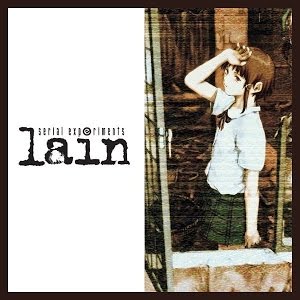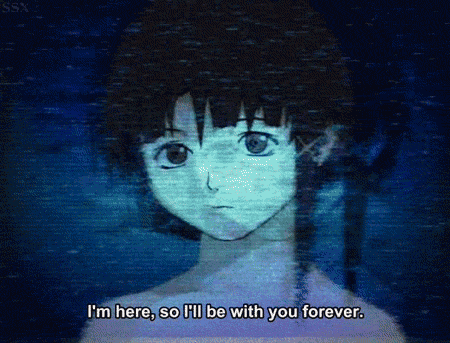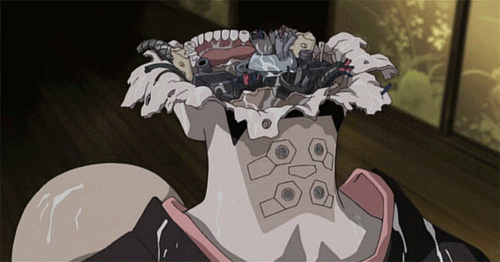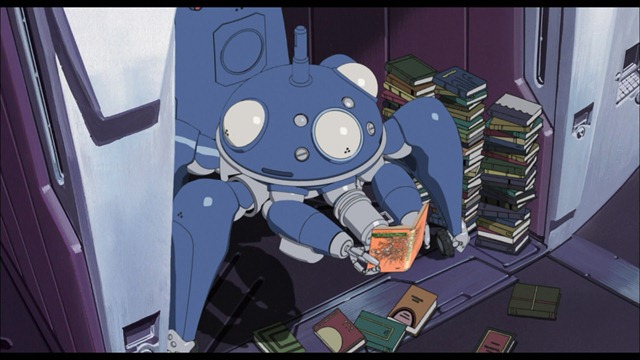 |
| Featuring Lain Iwakura. |
"The richness of life lies in the memories we have forgotten." ~Cesare Pavese
Serial Experiments Lain is an anime that's not going to pander to everyone's tastes, but this is not necessarily bad. I'll be honest, before I even started reviewing anything, I watched this a while ago and thought its meaning was 2deep4me. After rewatching it lately, I think I finally understand its many quirks and believe that I should do the title some justice.
For an anime that aired in 1998, the quality of this show outshines almost all, if not all other anime ever made. It's messages are vague, but enlightening due to its thematic genius. Serial Experiments Lain turns the anime industry on its head with its own artistic flair and deep implications supported by a cast of meaningful characters and staunch writers that make this show one of the best I've ever seen. It may leave your head spinning, but Lain certainly delivers in this psychological ride full of unexpected twists and turns.
SYNOPSIS
 |
| PC master race, am I right? |
Present day, present time (present being 1998). Humans have created communication networks that bring everyone together using a system called "the Wired," which is equivalent to the internet we use today. This network is more advanced though, utilizing lifelike virtual reality systems accessible by a home computer known as a "Navi." The system originates from the original telephone and TV networks, which was supplemented by the internet, introduced later on.
The series opens with a scene of a girl named Chisa jumping off a building to her death. She claimed that, since she was no longer needed in the real world, she should just move to the Wired, leaving her body behind to kill itself. She was not the first, nor the last, to do this. Many related incidents begin surfacing regarding apparent suicides.
"There was no reason for me to stay in the real world any longer. In the
real world, it didn't matter if I was there or not. When I realized
that, I was no longer afraid of losing my body." ~Chisa Yomoda
Lain Iwakura, our main character, is not adept at using current technology. Up until now, she had been using a Navi made for children. It's long outdated and underpowered compared to newer, more modern Navis. Being somewhat socially awkward, she has no real need to upgrade to VR systems. However, an email from the recently deceased Chisa makes her express interest in getting a new Navi, to which her father eagerly approved. He buys her a top-of-the-line Navi meant for adults. Lain obtains a Psyche chip, a modification that allows users to further deepen their connection to the Wired. She becomes obsessed with her computer - so much so that monitors and wires fill her room with holographic displays and a liquid carbon dioxide cooling system. It becomes pretty evident that her Navi is more than just an ambitious side project, as she starts distancing herself further from her friends for the world of the Wired. When people begin spotting her online, they notify her of her strange behavior, claiming she's a completely different person online. Lain attempts to get to the bottom of this, and in the process, learns about the nature of the Wired, the world, as well as her reason for existence. This is a story of mystery, of friendship, of loneliness.
REVIEW
 |
| Very deep indeed. |
There is one term that accurately describes Serial Experiments Lain: mindfuck. I have never seen a show so beautifully abstract and diverse in meaning and themes before. For one, the story is not linear. It often circles back to prior events by referencing them or using flashbacks. All the while, it incorporates an interesting dynamic that keeps viewers heads spinning; Lain often traverses both the virtual world and the real world without making the viewer aware of the changes, creating a sense that the two worlds are being blurred. This is integral to the show as she is a key component to the merging of both worlds, and is one of its strongest aspects. With Lain constantly transitioning between them, it becomes difficult to tell which is real and which is not. Lain also interprets her realities differently based on her emotions, leading to otherworldly sequences fueled by the thoughts of her nightmares.
Serial Experiments Lain also does an incredible job balancing the contrasting ideas of isolation and connection. As Lain dives further into the Wired, she becomes increasingly antisocial in the real world. Add in the fact that she has only a few friends, a neglectful mother, an expressionless sister, and a hands-off father, she has no one to turn to in the real world, making her feel unneeded by it. This ties into the suicides earlier in the series well. As a result, she becomes quiet in the real world, but takes on a completely different personality in the Wired. On the internet, she becomes rather straightforward, rude, and aggressive. This leads into the topic of dissociative identity disorder (DID), otherwise known as multiple personality disorder. She takes on the attitude that those around her perceive her as, thereby creating a state of existence where she can be and act the way people think she does. She essentially embodies those perceptions on the Wired, which creates a mystery that can be difficult to comprehend.
Religion becomes a topic of discussion and contemplation later in the series. The show questions the existence of a "God" in the real world, and also draws implications that a god does exist in the world of virtual reality. Always watching, never interfering, all a god can do is simply kick back and watch as information is shared, interactions are exchanged, and people are killed. Serial Experiments Lain defines precisely what makes someone/something a god: a god must be an omnipresent being with overwhelming power supported by faithful believers. Because Lain has the ability to be in both planes of existence while having power, she often questions what a god is. To be a god is to be alone, which ties back to Lain's detached nature from society. When unusual events in the Wired begin materializing in the real world, people, especially children, begin behaving strangely, which relates to the followers of such a god. Man determines his own destiny. Since they are the ones that created the virtual world they use, does this make mankind the true god of that world, or is the being that wields the most power within the network itself considered god? Lain poses many of these questions in ways unmatched by any other anime out there.
"Mankind is a creature that no longer evolves, is it not? One theory says
that man is a neoteny and is no longer able to evolve. If this is true,
then what an absurd creature mankind has evolved into. Not knowing what
it is that drives them they keep their bodies merely to satisfy the
desires of the flesh. They're worthless, don't you think? That's all
mankind is." ~Masami Eiri
Among lesser themes include the power of friendship, the concept of memories, as well as the meaning to life. With a virtual reality system like the Wired, one could essentially be free of death if they were to live there. So why live in the real world? Serial Experiments Lain offers a surprisingly simple answer that brings up the idea of humanity itself. The power of friendship is not that of Fairy Tail; no, this is executed in the signature dark and twisted fashion the anime establishes from day one. It is humanity itself that lets the concept of friendships stay real in this anime. However, these friendships are tested when memories become manipulable by using Navis as a medium to directly access the brain from the Wired. As said in the anime, memories are simply records. Memories are not defined by the person, but they do define the person. Therefore, if memories are erased, the event never happened, thus reverting the mental state of a person. This brings up the matter of humans vs. machines again, which the show answers simply by making man out to be like a machine.
 |
| Not exactly words of encouragement. |
This brings us to the matter of character relations. It's evident why Lain has so few friends. She isn't one to strike-up a conversation with anyone. As she looks upon the world with nonchalant eyes, she only feels unwanted by society. However, there is a certain, outgoing person willing to include her in their group. This would be Arisa, a frequently recurring character who reaches out to Lain. Ironically, whenever something seems to go wrong or weird in the anime, Arisa immediately suspects Lain. Though she usually brushes it off and slaps a convincing smile on her face, her fears build up over time, and like a shaken up can of coke, finally explode. This relationship is extremely well-developed as characters dynamically show new faces and emotions with each passing episode.
Lain does not have positive relations elsewhere though. Her sister is indifferent to everything, not caring about anyone in the family, especially Lain. Her father is highly fond of the Wired, and when Lain tells him that she wants a new Navi, he orders in enthusiastically. As the anime progresses, his father shows his concern for her, but these feelings never manifest and he turns to blissful ignorance. Lain's mother is also uncaring, with short-lived dialogue sequences between them being few and far between.
Serial Experiments Lain is NOT a fantasy. The surrealistic art and animation sure take a sense of reality away from the show, which was its objective all along. Lain is classified as science fiction, more specifically cyberpunk. The anime uses actual science concepts in order to justify the events of the story. I'd strongly suggest that viewers with a weak base in science study up on Schumann Resonances before watching, as they become important later on. There is only one thing I fail to understand, and that's the parts where entities from the Wired cross into the real world. The physics simply don't exist during these moments, making it seem weird. I have a theory as to how it could happen (they're illusions caused by manipulating Schumann Resonances), but it's simply a theory with very little ground to stand on. This doesn't detract from the series since my guess was enough for me to cover the biggest plot hole in the show.
"If you're not remembered, then you never existed." ~Iwakura Lain
 |
| More Lain. |
For an anime that aired in 1998, the art and animation are incredible. The camera perspectives are better than even those used by directors today. Serial Experiments Lain can be very colorful at times, but often likes using hues that greatly contrast each other. Funny how well it works for the anime. While some sequences were total acid trips that seemed meaningless, most were not, and you'll actually notice things that tend to happen over and over again in the plot. One such thing is Arisa's apologetic nature. While the animation is altered to be colorful with quickly changing scenes, it effectively shows things the viewer may not have kept track of that contribute a great deal to the development of characters. The art direction made up a good proportion of the show's success.
The soundtrack may be the weakest part of the show, and that's not saying much. The intro is an almost country-like track that actually works with the show. I'm not big on country music, but this sounds more like a mix with older pop music, so it's actually kinda catchy. It's in english too, which is convenient, I suppose.
OVERVIEW
I think Serial Experiments Lain easily takes the cake for the best anime I've seen to date. It blends a large amount of high caliber themes in ways I can barely comprehend. There's likely even more that I haven't been able to cover in this analysis, which will only further cement its place as I continue processing the events and concepts that make up Lain. The show never fails to entertain. I haven't been on the edge of my seat in a while, so this show definitely reminded me of memories when I enjoyed anime at its best. Lain certainly makes every second of it matter. You may find it surprising that, at 13 episodes strong, it beat out just about everything else on my list. I highly recommend that you give it a try. Again, it's not for everyone, but there is a chance that you may get the same enjoyment that I have gotten out of it.
Narrative: 10.00/10 (x2)
Characters: 10.00/10 (x2)
Aesthetics: 9.90/10 (x1)
Execution: 10.00/10 (x2)
Value: 10.00/10 (x3)
Composite: 9.99/10 (99.95% A+) "Essentially a 10/10 from me. Couldn't recommend it more."


























